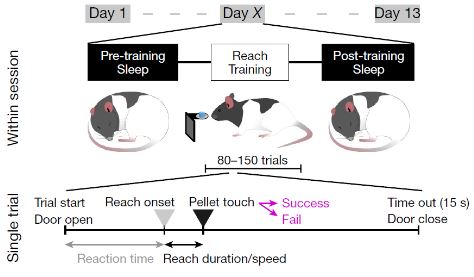January 09, 2023
Author: Manish Verma
Editor: Dr. Jitendra Kumar Sinha
Motor learning, which entails acquiring new muscle coordination, produces motor memory. Humans can develop both rigid and flexible motor behaviors through this process. This enables us to recall the motor coordination we have acquired to interact with our surroundings. Activities like athletics, playing piano, or riding bicycle. These are some examples of behaviors that are hard to forget. Have you ever considered the actual mechanics of this procedure? What occurs in our brains as we learn new motor skills? Let’s look.
It has long been assumed that memory stabilization through system consolidation occurs in two stages. Although there is evidence for both a hippocampus-dependent and independent phase in both classic and recent studies, new memories demand the hippocampus, but they gradually integrate into cortical networks, becoming independent of the hippocampus. Yet, it is unclear how hippocampal-cortical communication affects the evolution of cortical representations. Furthermore, it is unknown at what intervals such coordination takes place and what procedures might guide changes in stage throughout systems consolidation.
Researchers have now shown how this type of memory is reinforced as we sleep, when our brain reviews the information, we learned that day to subconsciously guide our behavior.
“In sports, even the best players make mistakes, and that’s what keeps the game exciting,” said Karunesh Ganguly, MD, PhD, UCSF Weill Institute for Neurosciences professor of neurology. “Perfect performance isn’t the goal of motor memory. It’s all about expected errors and predictable successes. As long as the mistakes remain consistent from day to day, the brain responds, “Let’s simply lock this information in.”

Figure – Flow chart of reach-to-grasp task training experiment
(Reproduced directly from Ganguly et al., 2022)
Ganguly et al., 2022, discovered that the “locking in” process, which occurs during deep restorative sleep known as non-REM sleep, includes some fairly sophisticated communication across several brain regions. The same researcher who previously uncovered the sleep-related brain waves that enhance skill memory stated that sleep is vital since our conscious minds prefer to focus on failures.
In their experiment, the researchers presented a skill learning task to track the dynamics of cross-area connection during non-rapid eye movement sleep, as well as changes in primary motor cortex (M1) representational stability. The rats were given the task of reaching for pellets. And the brain activity was examined during NREM sleep in three regions: the hippocampus, which is involved in memory and navigation; the motor cortex; and the prefrontal cortex (PFC).
(See figure)
13 days passed, and a pattern started to take shape.
First, in a process known as “fast learning,” the PFC interacted with the hippocampus, allowing the animal to comprehend its mobility in relation to the space surrounding it and it position in that space. During this stage, the brain appeared to be exploring and comparing all of the actions and patterns that developed when performing the activity.
Second, in a process known as slow learning, the PFC seemed to make value judgements, which were likely driven by reward centers that were active when the activity was successful. With the motor cortex and the hippocampus, it participated in cross-talk, reducing signals associated with failures and enhancing signals associated with successes.
Last but not least, when the electrical activity of the areas synchronized, the hippocampus’s function diminished, and the instances the brain had flagged as rewarding were brought to the forefront, where they were stored in what we now refer to as “motor memory.”
In conclusion, the study uncovered evidence for dynamic hippocampal-cortical communication during adaptation and learning processes.
Keywords:
PFC – Prefrontal Cortex
NREM – Non-Rapid Eye Movement
References:
- Kim, J., Joshi, A., Frank, L., & Ganguly, K. (2022). Cortical-hippocampal coupling during manifold exploration in motor cortex. Nature, 10.1038/s41586-022-05533-z. Advance online publication. https://doi.org/10.1038/s41586-022-05533-z
- Sinha, J. K., Vashisth, K., & Ghosh, S. (2022). The importance of sleep studies in improving the health indices of a nation. Sleep medicine: X, 4, 100049. https://doi.org/10.1016/j.sleepx.2022.100049
- Ghosh, S., Sinha, J. K., Khan, T., Devaraju, K. S., Singh, P., Vaibhav, K., & Gaur, P. (2021). Pharmacological and Therapeutic Approaches in the Treatment of Epilepsy. Biomedicines, 9(5), 470. https://doi.org/10.3390/biomedicines9050470